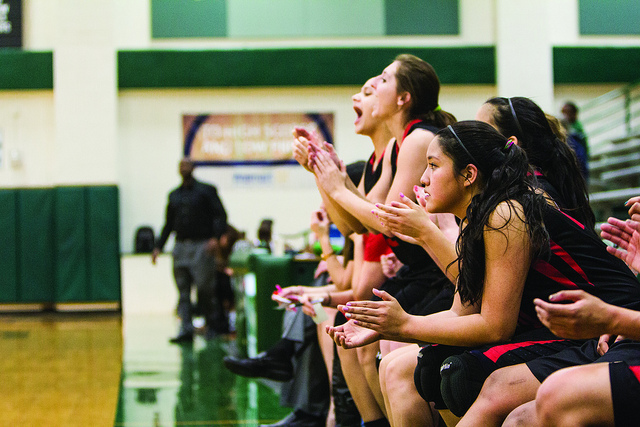For this column today, I’d like to take the chance to introduce you to our Sixth Woman.
Anyone who knows me even slightly should already be raising their eyebrows at the title of this column. I am not exactly a sports fan. My favorite thing to do when watching football, basketball, or baseball with my husband is to shout “Go sportsball!” and laugh uproariously. And yet, here I am, employing a sportsball metaphor — basketball, to be exact — to talk about preaching. (And yes, for all of you who were wondering: this column’s topic was absolutely my husband’s idea.)
The Sixth Woman or the Sixth Man is a basketball term for the first player who substitutes in when a starter needs it. They are typically as good as any starter and often get just as much playing time. Both the WNBA and the NBA give awards each year to the best sixth woman or man. And here’s the kicker: one of the signs of a great team is not how great their starters are, but how impressive their sixth woman or man is.
So, here’s a question for you: who’s your Sixth Woman when it comes to preaching?
And I’m not talking about retired pastors: in my last call, there was a woman in one of my churches who consistently did pulpit supply for her own church when the pastor was going to be gone. She even got called in to do pulpit supply for neighboring churches at times. She never went to seminary, works as a newspaper editor, raises goats, and has been a member of this church for over 20 years. Whenever she was going to be preaching, she met with one of the pastors to do some text study, and I always learned something from her whenever I got the chance.
She was our Sixth Woman, and she preached beautifully.
This wasn’t something we undertook lightly, just throwing people at the pulpit to fill it with warm bodies when pastors were going to be gone. The pastoral role is important and it is essential it is filled with people who are well trained. About a decade ago, the congregation supported our Sixth Woman attending lay preaching classes. (Some denominations have dedicated classes for this purposes: if you’re in ELCA Region 3, contact your synod office and ask about the Lay Preaching Courses.) We never once had to steer her away from questionable theology, and she rarely turned down the opportunity to preach, as nervous as it made her.
She was our Sixth Woman, and she preached carefully.
Having a Sixth Woman is not just a boon to congregations looking to get a break on paying mileage for pulpit supply; it is a huge benefit to the pastors. Our Sixth Woman became one of the biggest advocates for the pastoral team. She never once questioned the amount of energy that it takes to do Sunday morning services. She understood the necessity for continuing education. She was highly involved in her church and at the synod level as well.
She was our Sixth Woman, and she ministered both to people and to pastors.
Who is your Sixth Man? Giving away the pulpit can feel scary — like what are pastors actually good for if we’re just training ourselves out of a job? Or I can feel like adding another weight to the burden — because really, won’t it take that much more work to train someone than to just do the job ourselves? But our call as pastors, as a wise pastor once reminded me, is given a job description only once in the entire Bible: Ephesians 4: 12 — “to equip the saints for the work of ministry, for building up the body of Christ.”
Equip the saints. And in doing so, bless and equip yourself. And so, I ask you, dear Working Preachers:
Who is your Sixth Woman?
In Rachel Wrenn’s bimonthly Working Preacher column, “Notes from the Field,” this pastor and Ph.D. candidate offers a fresh approach to preaching in light of the everyday and the extraordinary.

